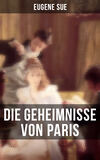Kitabı oku: «Pride: One of the Seven Cardinal Sins», sayfa 11
CHAPTER XX
ATTENTIONS TO THE HEIRESS
Near the close of the day in which Ernestine de Beaumesnil had unconsciously been the object of so much avaricious envy, and of so many more or less perfidious machinations, the young girl was alone in one of her sumptuous apartments, awaiting the dinner hour.
The richest heiress in France was far from being beautiful or even pretty. Her high forehead, prominent cheekbones, and rather long chin imparted considerable irregularity to her features, but this was soon forgotten in the charm of the young girl's face and expression; for the forehead, fair as alabaster, and surrounded with a wealth of rich chestnut hair, surmounted blue eyes of infinite sweetness, while rich scarlet lips, pearl white teeth, and a smile that was both ingenuous and melancholy seemed to implore forgiveness for the imperfections of the face.
Ernestine de Beaumesnil, who was now only sixteen, had grown very rapidly, so, although her tall figure was perfectly straight and symmetrical, the young girl, who had but just regained her health, still held herself slightly bent, an attitude which made the graceful lines of her remarkably beautiful throat all the more noticeable.
In short, antiquated and common as the comparison is, the expression, a lily bending upon its stem, described Ernestine de Beaumesnil's appearance exactly.
Poor orphan, crushed by the sorrow which her mother's death had caused her!
Poor child, overwhelmed by the, to her, crushing weight of her colossal wealth!
Strange contrast, indeed! It was pity, an even tender pity which the face and eyes and attitude of this heiress of almost royal wealth seemed to invoke!
The plain black dress which Ernestine wore enhanced the remarkable brilliancy of her complexion; but as she sat there with her hands folded upon her knees, and her head bowed upon her breast, the young orphan looked very sad and thoughtful.
It was half past five when the girl's governess stole softly into the room and said:
"Will mademoiselle see Mlle. de la Rochaiguë?"
"Certainly, my good Laîné," replied the girl, startled out of her reverie. "Why doesn't Mlle. de la Rochaiguë come in?"
The governess went out and returned almost immediately, followed by Mlle. Helena de la Rochaiguë, who made two profound and very ceremonious bows, which the poor child instantly returned, surprised and pained to see a woman of Mlle. Helena's age approach her with such obsequiousness.
"I thank Mlle. de Beaumesnil for having kindly granted me a moment's conversation," said Mlle. Helena, in a formal but extremely deferential tone, making another low bow, which Ernestine returned as before, after which she said, with evident embarrassment:
"I, too, have a favour to ask of you, Mlle. Helena."
"Of me? How glad I am!" exclaimed M. Macreuse's protectress, quickly.
"I beg you will have the goodness to call me Ernestine instead of Mlle. de Beaumesnil. If you knew how it overawes me, mademoiselle."
"I feared I should displease you, mademoiselle, by being more familiar."
"Once more I beseech you to say 'Ernestine' and not mademoiselle. Are we not relatives? And after a little, if you find I am deserving of your love, you will say 'My dear Ernestine,' will you not?"
"Ah, my affection was won the moment I saw you, my dear Ernestine," replied Helena, with effusion. "I could see that all the Christian graces, so adorable in one of your years, flourished in your heart. I will not speak of your beauty, though it is so charmingly spirituelle in its type, for you look like one of Raphael's madonnas. Beauty," continued the devotee, casting down her eyes, "beauty is a fleeting gift and valueless in the eyes of the Saviour, while the noble qualities with which you are endowed will ensure your eternal salvation."
Overwhelmed by this avalanche of extravagant praise, the orphan did not know what to say in reply, and could only stammer a feeble protest:
"I do not deserve such praise, mademoiselle," she said, "and – and – "
Then, well pleased to discover a means of escaping this flattery which made a singularly unpleasant impression upon her in spite of her inexperience, she added:
"But you said you wished to ask me something, did you not, mademoiselle?"
"Yes," responded Helena, "I came to ask your wishes in regard to service to-morrow."
"What service, mademoiselle?"
"Why, the holy office we attend every day."
Then, seeing that Ernestine evinced some surprise, Mlle. Helena added, sanctimoniously:
"We go every day to pray an hour for the souls of your father and mother."
Until then the young girl had never had any fixed hour to pray for her father and mother. The orphan prayed nearly all day; that is to say, almost every minute she was thinking with pious respect and ineffable tenderness of the parents whose loss she so deeply deplored. Now, scarcely daring to decline mademoiselle's invitation, Ernestine sadly replied:
"I thank you for the kind thought, mademoiselle. I will accompany you, of course."
"The nine o'clock mass would be most suitable, I think," said the devotee, "and that is said in the Chapel of the Virgin, for whom you have a special preference, I think you remarked last evening, Ernestine."
"Yes, mademoiselle, every Sunday in Italy I attended mass in the Chapel of the Madonna. She, too, was a mother, so it seemed most fitting that I should address my prayers for my mother to her."
"They will certainly prove efficacious, Ernestine, and as you have commenced your devotions under the invocation of the mother of our blessed Saviour, it would be well to continue them under the same protection, so we will perform our devotions in the Chapel of the Virgin every morning at nine o'clock."
"I will be ready, mademoiselle."
"Then will you authorise me to give the necessary orders so your carriage and servants will be ready at that hour?"
"My carriage, – my servants?"
"Certainly," said the devotee, with emphasis. "Your carriage, with your own coat of arms emblazoned upon it, and draped in mourning. One of the footmen will follow us into the church, carrying a black velvet bag containing our prayer-books. You know, of course, that is the custom followed by all people of fashion and position."
"Forgive me, mademoiselle, but I really do not see the use of so much pomp. I go to church only to pray, so can we not go afoot? The weather is so delightful at this season of the year."
"What an admirable example of modesty in the midst of opulence, and simplicity in the midst of grandeur!" cried the devotee. "Ah, Ernestine, you have indeed been blessed by the Saviour. Not a single virtue is lacking. You possess the rarest of all, saintly, divine humility, – you who are, nevertheless, the richest heiress in France."
Ernestine gazed at Mlle. Helena with increasing astonishment.
The artless girl did not feel that she was expressing any remarkably laudable sentiments in saying that she preferred to walk to church on a delightful summer morning; so her surprise increased on hearing the devotee continue to laud her to the skies in almost ecstatic tones.
"The grace of Heaven has indeed touched your heart, my dear Ernestine," she exclaimed. "Yes, yes, everything indicates beyond a doubt that the Saviour has blessed you by inspiring you with the most profoundly religious sentiments, by giving you a taste for an exemplary life, spent in the exercise of a piety which does not forbid those harmless diversions which may be found in society. May God protect and watch over you, my dear Ernestine, and soon, perhaps, he will give you a still more unmistakable sign of his all-powerful protection."
The loquacity of the usually silent and reserved devotee was interrupted by the appearance of Madame de la Rochaiguë, who, less discreet than her sister-in-law, entered unannounced.
The baroness, greatly surprised to find Ernestine tête-à-tête with Helena, eyed the latter rather suspiciously, but the devotee assumed such a vacant and sanctimonious expression that the lady's suspicions were instantly dispelled.
The orphan rose and advanced to meet Madame de la Rochaiguë who, bustling in, bright and sparkling and smiling, said to the girl in the tenderest manner, seizing both her hands:
"My dearest child, I have come – if you will permit me – to keep you company until the dinner hour, for I am really jealous of my dear sister-in-law's good fortune."
"How very kind you all are to me, madame!" replied Ernestine, grateful for the kind attentions of the baroness.
Helena rose to go, and, with the intention of anticipating any possible question Madame de la Rochaiguë's curiosity might prompt, said to the young girl:
"To-morrow morning at nine o'clock, that is understood, is it not?"
Then, after an affectionate nod of the head to the baroness, Helena departed, escorted to the door by Mlle. de Beaumesnil.
As she was returning to Madame de la Rochaiguë, that lady drew back a few steps in proportion as Ernestine approached, and said to her, in tones of tender reproach:
"Ah, my dear, sweet child, you are incorrigible!"
"And why, madame, do you say that?"
"I am terribly, pitilessly, brutally plain-spoken as I have told you. It is one of my greatest faults, so I shall scold you, scold you every day of your life, if you don't hold yourself straighter."
"It is true, madame, though I certainly try my best not to bend over so."
"But I shall not allow it, my darling child. I shall show you no mercy. What is the use of having such a lovely figure if you do not show it off any better? What is the use of having such a charming face, with such delicate features, and such an air of distinction, if you keep your head always bowed?"
"But, madame!" exclaimed the orphan, no less embarrassed by these worldly eulogiums than by those which the devotee had lavished upon her.
"Nor is this all," continued Madame de la Rochaiguë, with affectionate gaiety. "I have a good scolding in store for that excellent Madame Laîné. You have beautiful hair, and you would look a thousand times better if you wore it in curls. The carriage of your head is naturally so graceful and distinguished, – when you hold yourself erect, I mean of course, – that long curls would be wonderfully becoming to you."
"I have always worn my hair in this way, madame, and have never thought of changing my style of coiffure, it being, I confess, a matter of very little consequence to me."
"And that is very wrong in you, my dearest, for I want you to be attractive, very attractive. I am so proud of my charming ward that I want her to outshine everybody, even our greatest beauties."
"I could never hope to do that, madame," replied Ernestine, with a gentle smile.
"But you must and shall, mademoiselle," laughingly replied the baroness. "I want you to understand, once for all, that my ambition for you knows no bounds. In short, I mean that you shall be considered the prettiest and most charming of young girls, as you will by and by be known as the most elegant of women. It is true I saw you first only yesterday, but from certain traits and tendencies which I have noticed in you, I am sure, as I remarked just now, that you were born to be a brilliant star in the fashionable world."
"I, madame?" exclaimed the orphan, wonderingly.
"Yes, I am positive of it, for to be the rage it is not absolutely necessary to possess beauty or wealth or aristocratic lineage, or to be a marquise or a duchess, though it must be admitted that this last title aids one very materially. No, no, the one essential, I assure you, is a certain je ne sais quoi! You have it; it is the easiest thing in the world to discern it in you."
"Really, madame, you amaze me," exclaimed the poor child, utterly abashed.
"That is very natural, for you, of course, cannot understand this, my dear child; but I, who am studying you with the proud but jealous eye of a mother, do understand it. I can foresee what you will become, and I rejoice at it. No life can be half as delightful as that of one of society's favourites. Queen of every fête, her life is a continual enchantment. And, now I think of it, to give you some idea of the world of fashion over which you are certainly destined to reign some day, I will take you to the races in the Bois de Boulogne, where you will see the crême de la crême of Parisian society. It is a diversion entirely compatible with your mourning."
"Excuse me, madame, but such crowds always frighten me, and – and – "
"My darling child!" exclaimed the baroness, interrupting her ward, "it is useless to oppose me. I am the most obstinate creature in the world. Besides, I insist upon being treated as well as my good sister-in-law. By the way, my dear, tell me right here and now what you two have been plotting to do so early to-morrow morning."
"Mlle. Helena wishes to take me with her to church, madame."
"She is right, my dearest child. One should never neglect one's religious duties; but nine o'clock – that is frightfully early. Women of fashion never go before noon; then one at least has time to make a handsome morning toilet, and one also meets many of one's acquaintances there."
"I am in the habit of rising early, madame, and as Mlle. Helena seemed to prefer going at nine o'clock, it made no difference to me."
"My dear child, I told you a little while ago that I should be appallingly frank with you."
"And I shall thank you very much for it, madame."
"Of course, you ought not to be proud and arrogant because you are the richest heiress in France, but though you should not abuse your power to impose your wishes and caprices upon others, there is certainly no need of your going so far as to gratify the caprices of others. Do not forget that your immense wealth – "
"Alas! madame," said Ernestine, unable to repress two big tears that rose to her eyes and then rolled slowly down her cheeks, "on the contrary, I am doing my very best to forget this wealth, for it reminds me that I am an orphan."
"My poor dear little darling!" exclaimed Madame de la Rochaiguë, embracing Ernestine effusively, "how angry I am with myself for having unintentionally grieved you. Dry those lovely eyes, I beg of you. It makes me wretched to see you weep!"
Ernestine wiped away her tears, and the baroness continued, affectionately:
"Come, my child, you must be brave and sensible. Of course it is a terrible, an irreparable misfortune to be an orphan, but as the misfortune is irreparable you should make the best of it, and say to yourself that you at least are blessed with some devoted relatives and friends, and that, though the past is sad and gloomy, the future may be most brilliant."
As Madame de la Rochaiguë was thus consoling the orphan, a deprecating rap was heard at the door.
"Who is it?" inquired the baroness.
"Mlle. de Beaumesnil's majordomo, who solicits the honour of throwing himself at her feet."
Ernestine evinced so much surprise that the baroness said, smilingly:
"It is only one of M. de la Rochaiguë's jokes. It is he who is at the door."
Mlle. de Beaumesnil also tried to smile as the baroness said, in a loud voice:
"Come in, M. majordomo, come in!"
Whereupon the baron entered, showing his long teeth more than ever in the broad smile his joke had inspired. Approaching Ernestine with great deference, he bowed low before her and even kissed her hand, saying as he did so:
"Is my charming ward still content with me? Is anything lacking for her comfort? Does she find her establishment on a suitable footing? Has she discovered any inconveniences in her apartments? Is she satisfied with her servants?"
"There is nothing with which I can find the slightest fault," answered Ernestine; "quite the contrary, indeed, for this magnificent suite of rooms, exclusively for my use, is – "
"Nothing can be too handsome or too luxurious for the richest heiress in France," interrupted the baron, in his most peremptory tones.
"I am deeply gratified and touched by the affectionate welcome I have received from your family," said Ernestine; "and I assure you that everything else is of very little importance to me."
Just then the folding doors opened, and the butler announced, in a loud voice: "Mademoiselle is served."
CHAPTER XXI
THE HUNCHBACK MEETS THE HEIRESS
The baron offered his arm to Ernestine, and conducted her into the dining-room. Helena came in a few minutes afterwards, a trifle late by reason of having despatched a letter to Abbé Ledoux, announcing her plans for the morrow.
During the entire repast Ernestine was the object of the most obsequious attentions, not only from the baron and his wife and sister, but also from the servants, who were as deeply impressed as their employers by the magical power of those words, "the richest heiress in France."
Towards the end of the meal, the baron, with the most careless air imaginable, remarked to Mlle. de Beaumesnil:
"Well, my dear ward, as you have now recovered from the fatigue of your journey, it seems to me you ought to go out to-morrow and amuse yourself a little."
"Helena and I think so, too," replied Madame de la Rochaiguë, "so your sister is going to take Ernestine to church to-morrow morning. In the afternoon, Mlle. Palmyre and Mlle. Barenne will come with some dresses and hats I ordered yesterday for our dear child, and day after to-morrow Ernestine and I are going for a drive."
"Capital, capital!" exclaimed the baron. "I see that to-morrow and the day after will be fully occupied, but I think it is hardly fair for me to be so entirely left out, so I beg to have my turn on the day following. Will you grant my request?"
"Certainly, with the greatest pleasure," replied Ernestine.
"The readiness of the response increases its value two-fold," said the baron, with such evident gratitude that the orphan was wondering what she could have said when the baroness, turning to her husband, exclaimed:
"Well, let us hear your plans for your day, M. de la Rochaiguë."
"I am not so spiritual-minded as my sister, nor as worldly as you, my dear," answered the baron, "so I am going to propose to our dear ward (weather, of course, permitting) a visit to one of the most beautiful gardens in Paris, where she will see a wonderful collection of plants and flowers."
"You could not have pleased me better, monsieur," exclaimed Ernestine, delightedly. "I am so fond of flowers."
"Nor is that all," added the baron, "for, as I am a prudent man, in case of bad weather, my charming ward and I can enjoy a promenade through several superb conservatories, or a magnificent picture-gallery, rich in masterpieces of the modern school of art."
"And where is this combination of rare and beautiful things to be found, monsieur?" inquired Ernestine, with great interest.
"A nice Parisienne you are, and you, too, baroness, and you, too, my sister," laughed M. de la Rochaiguë, with a knowing air, "for I see very plainly that none of you have the slightest idea where this collection of wonders is to be found, though it is almost at your very door."
"Really," began Mlle. de la Rochaiguë, "I have been trying to think."
"And you can't imagine," retorted the baron, radiant. "Ah, well, I will take pity on you. All these wonders are to be found at the Luxembourg."
"The Luxembourg!" exclaimed the baroness, laughing. Then, turning to Ernestine:
"Ah, my dear child, it is a trap, an abominable trap, M. de la Rochaiguë has set for you. You don't know my husband's passion for another of the wonders of the Luxembourg. He has taken good care not to reveal that, I'll be bound!"
"And what is this other attraction, madame?" asked the young girl, smiling.
"Ah, you poor, dear innocent, let me tell you that M. de la Rochaiguë is quite capable of taking you to a session of the Chamber of Peers, under pretext of showing you beautiful conservatories and flowers and picture-galleries."
"Well, why should I not take her into the diplomatic gallery, if she wishes?" retorted the baron. "She will find plenty of good company there in the shape of the fortunate wives of foreign ambassadors and ministers, – for I maintain that there is not a more delightful, charming, and enviable position in the world than that of the wife of a minister and ambassador. Ah, my dear wife," added this unknown Canning, turning to the baroness, "what would I not give to be able to elevate you to such a position. You would be envied, flattered, adored! You would become, I am sure, a wonderfully clever politician! It is not unlikely that you would even control the state, perhaps. Could any woman desire a grander rôle?"
"You see what a dangerous flatterer M. de la Rochaiguë is, my dear child," remarked the baroness. "He is quite capable of imbuing you with a taste for politics, too."
"Me? Oh, I have no fear of that," responded Ernestine, smiling.
"You may laugh at me as much as you like, my dear," the baron said to his wife; "but I do assert that I perceive in our dear ward a thoughtfulness, a self-control, and a power of discrimination remarkable in one of her years, to say nothing of the fact that she strikingly resembles the portrait of the beautiful and famous Duchesse de Longueville, who exerted such a marvellous influence in politics under the Fronde."
"Well, well, this is really too much," exclaimed the baroness, interrupting her husband with a fresh outburst of merriment.
The orphan, who had suddenly become thoughtful, did not join in this gaiety. She was thinking how very strange it was that within the last two hours three persons had, in turn, discovered that she was so singularly adapted to fill three such entirely different rôles, viz.: That of a devotee, that of a woman of fashion, and that of a female politician.
The conversation was interrupted by the sound of carriage-wheels in the courtyard below.
"Haven't you given orders that you are not at home this evening?" inquired the baron, turning to his wife.
"No, but I am expecting no one, – that is, no one but Madame de Mirecourt, who, you know, occasionally drops in for a few minutes on her way to some ball or reception."
"Shall you see her in case she does?"
"If it will not be disagreeable to you, and if you will allow me to receive her in your drawing-room," said the baroness, turning to Ernestine. "She is a very charming woman."
"Do exactly as you please, madame," replied Ernestine, cordially.
"Show the visitor into Mlle. de Beaumesnil's drawing-room," the baroness said to one of the servants.
The man withdrew, but returned a moment afterwards to say:
"I showed the visitor into mademoiselle's drawing-room as madame ordered, but it is not Madame de Mirecourt."
"Who is it, then?"
"M. le Marquis de Maillefort, madame."
"That detestable man!" exclaimed the baron. "A visit at this hour is an inexcusable familiarity on his part."
The baroness motioned to her husband to be more guarded before the servants, then whispered to Ernestine, who seemed surprised at this incident:
"M. de la Rochaiguë does not like M. de Maillefort, who is really one of the most spiteful and mischief-making hunchbacks imaginable."
"A positive devil!" added Helena.
"It seems to me that I have heard my mother speak of a M. de Maillefort," remarked Ernestine, thoughtfully.
"That is more than likely, my dearest child," replied the baroness, smiling, "though no one ever speaks of M. de Maillefort as one's good angel."
"I do not recollect to have heard her say anything either good or bad about M. de Maillefort," answered the orphan. "I merely remember the name."
"And the name is that of a veritable ogre," said the baron, spitefully.
"But if M. de Maillefort is so objectionable, why do you receive him, madame?" inquired the orphan, hesitatingly.
"Ah, my dear child, in society one is obliged to make many concessions, particularly when a person of M. de Maillefort's birth is concerned."
Then addressing the baron, she added:
"It is impossible to prolong the meal farther, for coffee has been served in the drawing-room."
Madame de la Rochaiguë arose from the table. The baron, concealing his annoyance as best he could, offered his arm to his ward, and the entire party returned to the drawing-room where M. de Maillefort was waiting.
The marquis had so long been accustomed to concealing his love for Madame de Beaumesnil, – the one passion of his life, but one which she alone had divined, – that, on seeing Ernestine, he betrayed none of the interest he felt in her. He remembered, too, not without annoyance, that it would be necessary to appear curt and sarcastic before the orphan, as any sudden change in his manner or language would be sure to arouse the suspicions of the Rochaiguës, and, in order to protect Ernestine from them, and, perhaps, even from herself, or, in other words, to carry out her mother's last wishes, he must carefully refrain from exciting the distrust of those around her.
M. de Maillefort, who was endowed with remarkably acute powers of perception, noted, with a pang of real anguish, the unpleasant impression his appearance seemed to make upon Ernestine; for the latter, still under the influence of the slanders that had been heaped upon him, had involuntarily shuddered, and averted her gaze from his distorted form.
Painful as the feelings of the marquis were, he had the courage to conceal them, and, advancing towards Madame de la Rochaiguë, with a smile on his lips and an ironical gleam in his eye, he said:
"I am very bold, am I not, my dear baroness? But you know, or rather you are ignorant, that one has friends only to impose upon their good nature, at least unless, like Mlle. de la Rochaiguë here," he added, bowing low to that lady, "one has no faults at all, but is nothing more or less than an angel descended from heaven for the edification of the faithful. Then it is even worse, I believe, for when one is perfect, one inspires one's friends with envy, or with admiration, for with many people these two sentiments are one and the same."
Then, turning to M. de la Rochaiguë, he continued:
"Am I not right, baron? I appeal to you who have the good fortune not to wound either by your virtues or your failings."
The baron smiled until he showed his long teeth in the most startling fashion, then, trying to conceal his ill-humour, he exclaimed:
"Ah, marquis, marquis, always sarcastic, but always charming!"
Then seeing that he could not avoid introducing M. de Maillefort to Ernestine, who was watching the hunchback with growing uneasiness, the baron said to his ward:
"My dear Ernestine, allow me to introduce M. le Marquis de Maillefort, one of my particular friends."
After bowing to the young girl, who returned the bow with an embarrassed air, the hunchback said, with formal politeness:
"I am delighted, mademoiselle, to have still another reason for often coming to Madame de la Rochaiguë's house."
And as if he considered himself released from the necessity of paying any further attention to the orphan by this commonplace remark, he bowed again, and then took a seat beside the baroness, while her husband tried to conceal his ill-temper by sipping his coffee very slowly, and Helena took Ernestine a few steps aside, under pretext of calling her attention to the plants in a jardinière.
The marquis, without seeming to pay the slightest attention to Ernestine, never once lost sight of them. He had a remarkably keen sense of hearing, and he hoped to catch a few words of the conversation between the devotee and the orphan, while he chatted gaily with Madame de la Rochaiguë, both of them endeavouring to conceal their real thoughts under the airiest persiflage, and to try and discover what the other was driving at, in vulgar parlance.
The frivolous character of such a conversation favoured the hunchback's intentions, so, while he listened to Madame de la Rochaiguë with a distrait ear, he listened eagerly with the other to Ernestine, the baron, and Helena.
The devotee and her brother, believing the marquis absorbed in his conversation with Madame de la Rochaiguë, reminded the orphan, in the course of their conversation, of the promise she had made to accompany Helena to church the next morning at nine o'clock, and also to go with the baron a couple of days afterwards to view the wonders of the Luxembourg.
Though there was nothing extraordinary in these plans, M. de Maillefort's distrust of the Rochaiguë family was so great that he deemed it advisable to neglect no detail, however insignificant it might appear, so he noted these facts carefully, even while replying with his accustomed wit to Madame de la Rochaiguë's commonplaces.
The hunchback's attention had been divided in this way for, perhaps, a quarter of an hour, when he saw, out of the corner of his eye, Helena make a whispered remark to Ernestine, accompanied by a glance at Madame de la Rochaiguë, as if to say that it was not worth while to interrupt her conversation, after which the orphan, Helena, and the baron left the room.
Madame de la Rochaiguë did not perceive their intention until the door closed behind them, but their departure suited her perfectly. The presence of other persons would prevent the explanation she considered it absolutely necessary to have with the marquis, for she was too shrewd and too well versed in the ways of the world not to have felt certain, as she had said to her husband, that the marquis, in thus renewing their acquaintance after a long interruption, had been actuated by a desire to meet the heiress, concerning whom, consequently, he must have some secret designs.
The hunchback's love for Madame de Beaumesnil having been suspected by no one, and his last interview with the dying countess being likewise a secret, Madame de la Rochaiguë did not and could not suspect the solicitude the marquis felt concerning Ernestine.
But wishing to ascertain the designs of the hunchback, so as to circumvent them if they interfered with her own, Madame de la Rochaiguë abruptly changed the subject as soon as the door had closed upon the orphan, by saying:
"Well, marquis, what do you think of Mlle. de Beaumesnil?"
"I think her very generous."
"Very generous, marquis? What do you mean by that?"










